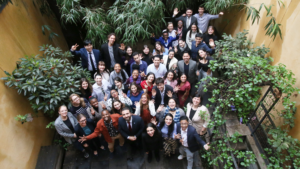As a WYA member and fellow, I am not that young, so I have already had the occasion to sit in international assemblies –European Union (27 states), Council of Europe (47 states) – where states and NGOs make their principled statements. Witnessing a global assembly is even more impressive, as it globalizes your political perspective, and helps you think of the “big picture”. In regards to development issues, you can hear concerns of developing countries directly. You know the latter are at a later stage of demographic transition, but you want to help them avoid your region’s mistakes.
As it is, I was never so directly in contact with the way cultural and wealth differences can affect policy in such assemblies. As the least developed countries are looked upon as too fertile, and encouraged to lower their fertility, the wealthiest countries struggle over the consequences of a fertility that is too low. Nonetheless, very few stress that the goal should be to find a balance in all this. The common idea remains that the more we are, the less we have, rather than the more we are, the more we can produce.
What strikes me most in all these statements is to hear China praise its population policy and family planning programs that many know to be coercive and burdensome on its citizens: China has succeeded in lowering its fertility in the last four decades. On the other side Sweden praises itself for its “pragmatic policies” enabling people to have all possible choices, and broad access to “modern contraceptives”. In all this, non-chemical ecological means of family planning are not deemed modern.
We hear a lot about population targets, and at the same time about the possibility to have choice. Apparently, both are compatible, thus investing in family planning and permitting broad access to modern methods of contraception would be the best investment a state could make. But for this, you would need to subsidize contraception so that people will use it. If the cost of a child is higher for a woman than contraception, will that woman not buy contraceptives herself? Is the cost of subsiding modern contraceptives not too high for these states : transportation, distribution, and subsidizing have costs too. What kinds of contraceptives can developing countries afford to subsidize? The most modern and safest ones? Are we Westerners, going to make them generous offers? Already in Europe, only the cheapest – and thus least secure – contraceptives are reimbursed by social security. Thus my question is: is the long-term cost of these policies taken into account? Are there better investments? Are there not more urgent needs to cover?
All these thoughts occupy my head while listening to statements. In the mean time, we try to find who in the room would be open to hear our concerns and arguments.
Lobbying ambassadors and ministers is not easy, but you get to enjoy and like it. Go to them, address our concerns, our wish to work with them to design long term policies. Thoughts turn fast in my head. Who should I address? What should I say? Is he open? Will he listen? Should I go to him again? Will I disturb? After trying, you get there. You find out that after all, these people, like you, lack some information and are always glad to discover an aspect of the problem nobody told them about. You remember that because you are the future, your future depends on expressing your thoughts to the people who decide. This is an incredible opportunity, and you must seize it. As it goes, you try, you fail, you learn and your fears progressively disappear.
So what am I going to tell him? Simply this. We are young, but we know the costs and opportunities life gives us. And like everybody else, we are happy to be able to make our own choices. But we do not want to be pushed into believing that having more than a given number of children is a burden on the community, and that we are guilty if we wish for more. If there is choice, there should be a choice to have children too, while being educated and working, and not only a choice to have fewer children. And we certainly do not wish that developing countries later face our current concern: that we may have to overwork all our life to pay the bill of our aging parents and the underrepresentation of our generation.
Bernadette Joyeux, European WYA Advocacy Fellow in NYC







